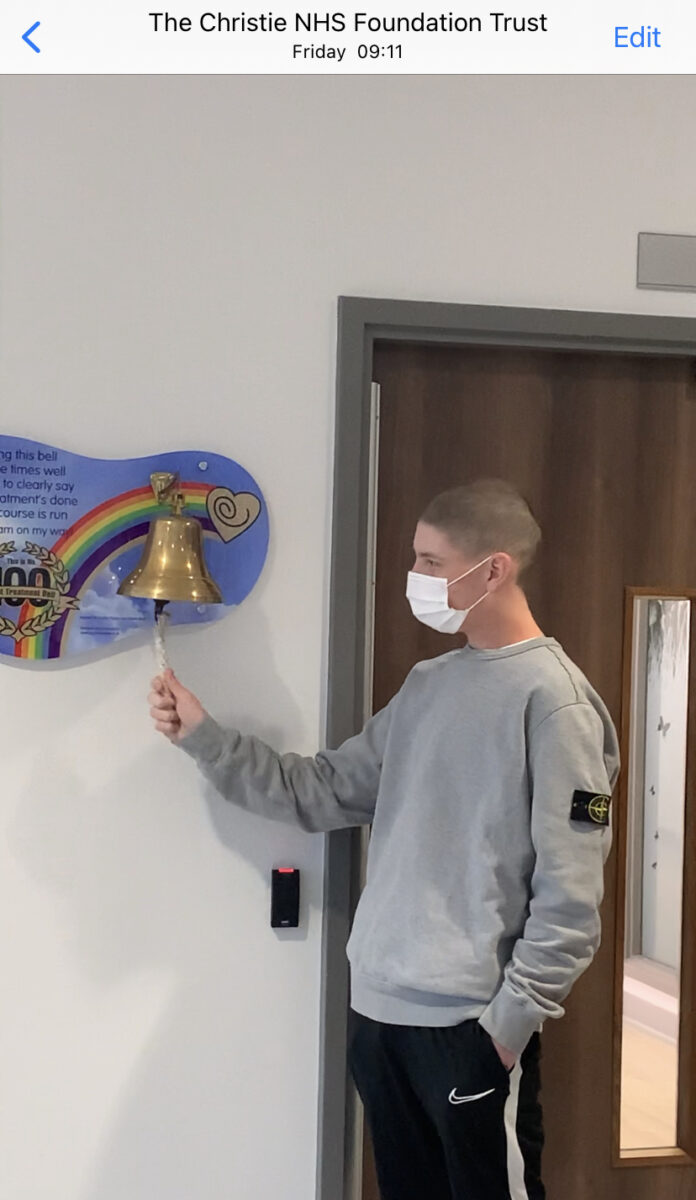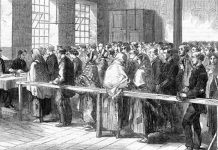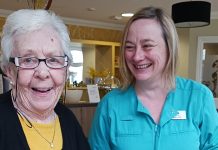A rugby mad teenager, who was told he had cancer on his 15th birthday, is celebrating the end of his proton beam therapy (PBT) after becoming the 2,000th person in the UK to benefit from this pioneering cancer treatment.
Ryan Scutt, aged 15, was diagnosed with the incredibly rare nasopharyngeal carcinoma in September last year. Nasopharyngeal cancer affects the part of the throat connecting the back of the nose to the back of the mouth (the pharynx). It is thought Ryan’s cancer is associated with a virus that causes glandular fever and affects just one in two million cases.
Ryan, from Gillingham in Dorset, was diagnosed after months of investigations. His mum Hayley said: “When Ryan first became unwell, he was lethargic, suffering from headaches and really wanted to be left on his own. He had hurt his shoulder playing rugby too, so at first, both us and his doctors were happy to put it down to typical teenage behaviour. But as it carried on, I became more concerned. He was developing more and more symptoms, getting worse by the day, and my mother’s intuition was telling me something wasn’t right.”
Various investigations eventually led to Ryan having a scan where the rare and aggressive tumour was revealed – occupying the nasopharynx (area behind his nose), pressing on his pituitary gland (controls metabolism, growth and other vital functions), carotid artery (blood vessel that supplies blood to the brain, neck and face) and optic nerves (nerves of vision). Two days later – on Ryan’s 15th birthday – he and his family were told it was cancer.
From that moment, everything changed for the Scutt family as Ryan immediately began his treatment journey. Hayley said: “It happened so quickly. It sounds like a cliché, but it was my worst nightmare as a parent, and even then so much worse than you could ever imagine. Everything changed. We had to have conversations no family should ever have to endure, but throughout it all I was stunned with Ryan’s attitude. Despite his diagnosis, he has shown remarkable bravery. He told me that worrying wasn’t going to change the outcome, so we should do what we have to do and face it. Since then, our mantra has been to take each day as it comes, and when a day at a time is too hard, we look at the next hour or even minute.”
A treatment plan was devised first focusing on an intensive and aggressive course of chemotherapy – followed by six and a half weeks of proton beam therapy.
PBT is a specialist form of radiotherapy that targets certain cancers very precisely, reducing side-effects. It targets tumours with less damage to surrounding healthy tissue and is particularly appropriate for certain cancers in children who are at risk of lasting damage to tissues that are still growing.
Ryan recently became the 2,000th proton beam therapy patient since PBT became available to the NHS in 2008. He was treated at the first NHS high energy PBT centre at The Christie which was part of a £250m investment by NHS England and which opened in 2018 and is now treating the vast majority of NHS patients referred for PBT. A second NHS centre will open later this year at University College London Hospitals. Initially the highly specialised treatment was only available abroad with the NHS funding patients’ treatment, but over the past decade the NHS has invested and trained its workforce so PBT can be delivered in the UK.
Professor Peter Johnson, NHS clinical director for cancer said: “There have been huge advances in precision cancer treatment and proton beam therapy is just one incredible example – we are delighted that we have treated 2,000 patients in England, like Ryan, with thousands more set to benefit from this groundbreaking treatment in the coming months and years.”
Following assessment by a national panel of experts, Ryan was accepted for treatment in Manchester and began a course of 34 daily proton treatments in December.
Sadly for Ryan, it meant he was separated from the majority of his family whilst he stayed in Manchester throughout his treatment. Ryan’s dad Stephen remained at the family home in Dorset with Ryan’s siblings, Daniel aged 23, Georgia, aged 17 and Charlie, aged 11.
Hayley said: “It was very difficult being away from home for so long and splitting our family in two, as we’re very sociable and close, but we did what we had to do. Christmas away from home was very hard, but we realised that doing this would ensure Ryan would get the best treatment to make sure he would have Christmas to celebrate in future years.”
Ryan finally finished his treatment at the end of January and was delighted to ring the end of treatment bell at The Christie to mark the occasion, before returning home to the rest of the family the very same day.
Ryan’s consultant at The Christie, Dr Shermaine Pan, said: “Ryan has been inspirational in his approach to treatment. Even on days, particularly after chemotherapy, when he was exhausted, he kept his head high, focused on the finishing line. Proton beam therapy, when compared to conventional radiotherapy provides teenagers like Ryan, who have curable tumours, the option for an equally effective treatment but with less dose to surrounding normal tissues and therefore, less risk of permanent long term side effects of treatment. This is important for someone like Ryan, who has a high chance of cure, and has years and decades of life ahead of him.”
After returning home to Dorset, Ryan had a difficult few weeks with two further hospital stays due to an infection, but this week he has started six months of beta interferon injections which is the next stage of his journey.
Scans have shown the tumour has responded to the treatment and Ryan is feeling much fitter and healthier. He will continue to have regular scans, but the family is hopeful the full course of treatment will completely cure him and Ryan is now looking forward to returning back to school gradually over the next few weeks.
Ryan said: “It has been a rollercoaster of emotions. I was really very poorly at one point, but even then I don’t think we all realised how serious it could be. I had dips during the chemo and the proton beam therapy, but I’m now feeling so much better and my headaches have gone completely. I was prepared for the worst when I came to The Christie for treatment, but it was massively better than I expected. I couldn’t ask for more.”
As well as starting back to school, Ryan now hopes to start to resume his fitness, and eventually return to playing rugby for his school, his local club in North Dorset, and Bath Rugby Club’s Developing Players Programme, where his ultimate goal is to become a professional rugby player. He also wants to return to his hobbies of fishing, fast cars, motorbikes, farming and food!
Ryan has seen a remarkable show of support from friends but also celebrities and professional sports stars including chef Gordon Ramsey, TV presenter Stephen Mulhern, the Bath Rugby team, rugby stars such as Jamie Noon and Danny Cipriani and those from the worlds of car racing and fishing, who have sent videos or Twitter posts of support which can be read on a special Facebook page his family have set up, called Ryan’s Road to Recovery
Ryan added: “I’d love to think I could become a professional rugby player one day, but right now I’d be happy to become fit and well enough to start training again. I’m over the moon I’ve finished this stage of my treatment. It has been a very long and slow process, but people have made it as easy as they can for me. The time away from home has been the hardest so I am looking forward to getting back to normal.”
Ryan decided to fundraise during his time in hospital so he could focus on something positive with his family and friends and has since raised £6,600 which he has donated to various cancer charities this week.







